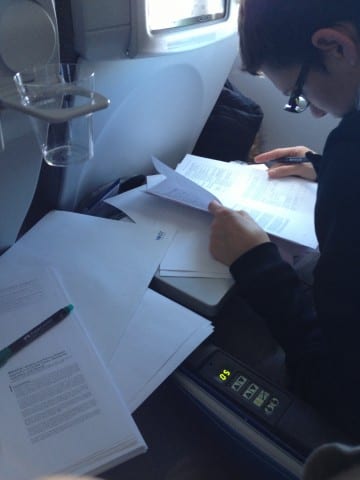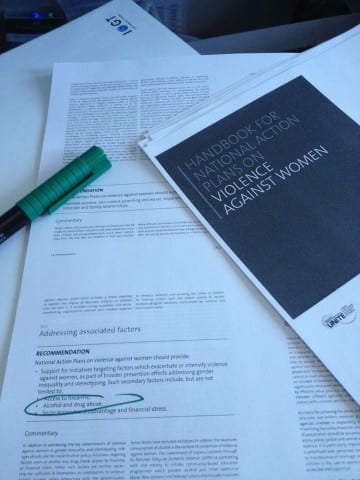I am actually in New York already. We flew via Frankfurt and we had such a good trip that we landed on JFK International airport an hour earlier.



Kristina and myself used the time on the plane to do two things: discuss the alcohol norm and prepare for the week ahead at the United Nations.
Discussing the alcohol norm
There is no chance of escaping, of getting a break from the alcohol norm that has infiltrated all parts of life, even above the clouds, in-between two continents. And we discussed how it affects children and women, and societies in general. I’ll have to write a separate a blog about that topic these days.
Prepare for the week ahead at the UN
We will attend many different events organised both by governments and civil society organisations. And we will hold our own event on Friday next week. And so it is important to be up-to-date, obviously. In order to be able to contribute to the discussions and to be able to understand as much as possible, we continued our preparations even above the clouds.
We are studying the news on gender equality and women’s issues, research reports and scientific evidence concerning the role of alcohol in violence against women and girls, especially domestic violence against women and girls. And we are analysing legislation and government policies from around the world that address violence against women, in particular its prevention.
A really good material is the “Handbook for National Action Plans on Violence against Women”.
The United Nations through its campaign UNiTE SayNO to violence against women put forward this manual for governments to effectively and comprehensively address the problem of gender-based violence.
Our analysis of policies and legislation from around the world shows that governments today don’t choose comprehensive approaches because policy measures that have a preventive effect are often not part of the policy mix: alcohol policies, like reducing availability and making alcohol less affordable, or banning alcohol advertising, or creating more alcohol-free, safe environments are largely left out.
In this reality it is good and hope-giving that UN Women takes up alcohol in the Handbook.
There is one recommendation that specifically tackles alcohol as risk factor for violence against women. National Action Plans on violence against women should provide:
Support for initiatives targeting factors which exacerbate or intensify violence against women, as part of broader prevention efforts addressing gender inequality and stereotyping. Such secondary factors include, but are not limited to:
- Access to firearms;
- Alcohol and other drugs; and
- Socio-economic disadvantage and financial stress.
While such factors are neither necessary nor sufficient in themselves as contributors to violence against women, when interacting with the determinants of gender inequality and stereotyping they can increase the frequency or severity of violence. It is important to recognize, therefore, that addressing these factors alone will not prevent violence, merely support the overall prevention effort.”
HANDBOOK FOR NATIONAL ACTION PLANS ON VIOLENCE AGAINST WOMEN, UN Women, 2012
We find that UN Women does not address alcohol’s role in the epidemic of violence against women as consequently and comprehensively as they should but at least they acknowledge the role alcohol plays in violence against women. We are discussing controversial formulations such as that only addressing alcohol will not prevent violence, or that alcohol was neither sufficient nor necessary contributors to violence in itself. Both points seem to wrong. The science does not support them.
And so, we feel that we have our work cut out for us to take alcohol prevention considerations into the heart of the Women’s Rights movement.
As our preparations continue, our excitement is rising to engage in these conversations during the coming week at the United Nations Commission on the Status of Women (CSW).
The priority theme of the 57th Session of the Commission on the Status of Women is the “Elimination and prevention of all forms of violence against women and girls“. We look forward to raise awareness of alcohol violence against women and the potential of alcohol policy to catalyze gender equality and women empowerment.